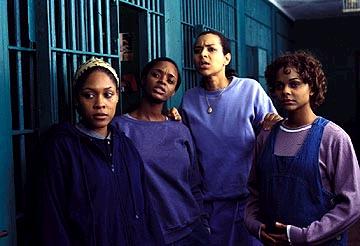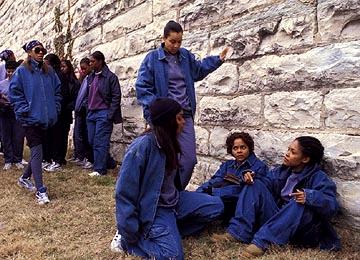

To her credit, director Neema Barnette (Spirit Lost) and writers Preston Whitmore (Lockdown, Fled) and Joyce Renee Lewis (Spirit Lost) reject the typical plot points of a woman in prison movie. Civil Brand has no gratuitous nudity, shower scenes, or lesbian love, and as strange as it is to say this, the movie would probably be better if some of this was in it. At least the inclusion of trash would make Civil Brand a guilty pleasure instead of what it is, a sad attempt at social commentary. Civil Brand takes a look at prisons that profit off the inmates. They use them as cheap labor, and keep all the profits. Barnette wants to say that this is wrong, but goes about it all wrong. The biggest element dragging the film down is the extreme overacting by all of its protagonists, and annoying narration by rapper Da Brat (Glitter, Carmen: A Hip Hopera).
Barnette reveals everything through the eyes of Frances Shephard (LisaRaye, All About You, Date From Hell). Shepard is the newbie at Whitehead Correction Institute. She was convicted of murdering her husband, but it was an act of self-defense. He was a wife-beater, and she was defending herself. Prison is unlike anything she experienced before, and adjusting is difficult. All she wants to do is speak with her young daughter. She soon befriends a group of women that include the tough Nikki (N'Bushe Wright, 3 Strikes, Blade), God-fearing Little Momma (Lark Voorhies, How High, Fire & Ice), and some other uninteresting people. Also new is Michael Meadows (Mos Def, The Italian Job, Brown Sugar), a new guard. He has a college education, and the more he finds out about the prison, the more uncomfortable he becomes.
Warden Nelson (Reed R. McCants, Spirit Lost) thinks he runs the place, but the real power lies with Capt. Deese (Clifton Powell, Friday After Next, Bones), who is not above using violence and sexual intimidation to get the women to obey him. They work in sweatshop like conditions and suffer verbal, emotional, physical, and sexual abuse from Deese and some of the other guards. Deese has eyes for Nikki, but she spurns all his advances. Slowly, Frances and Nikki realize that they must rise up reclaim their rights, and after this point Civil Brand goes from mildly uninteresting to downright ridiculous.
The plot loses what little semblance of logic it had and becomes a joke. The women concoct a dumb scheme in order to alert the outside to what is happening inside. This combines with a generous helping of screaming, courtesy of Wright and LisaRaye. Barnette lets them bond over their feelings for their daughters, and when they cannot see them they overact. Instead of screaming their lungs out, Barnette should have made the scenes quieter, to convey a deeper sense of loss. As is, there are far too many scenes like this, and they gradually coalesce into one and force the viewer to tune out. Barnette also falters by making all of her women sympathetic. The line between the good guys (or girls) and the bad guys is clear and definite, although some of the women are flawed characters. The script glosses over these facts, focusing instead on the imposing Powell and McCants, who acts like if he had a long moustache, he would stoke it and sneer. These are simplistic portrayals that only detract from Barnette's noble intentions, and sink Civil Brand.